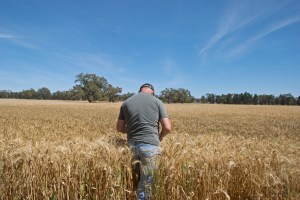 I’m taking a couple of weeks to do some hiking and praying off in the woods. While I’m gone I’ve felt that I should repost my Top 10 most read articles. Some of you have been following me long enough to have read them already. If so, my prayer is that they will again be a blessing to you.
I’m taking a couple of weeks to do some hiking and praying off in the woods. While I’m gone I’ve felt that I should repost my Top 10 most read articles. Some of you have been following me long enough to have read them already. If so, my prayer is that they will again be a blessing to you.
At one time I did a series of posts about Jesus’ view of His ministry. To see the original series, click here.
It occurred after Jesus had talked with the woman at the well. The Lord told His disciples that He had food they didn’t know about. He was talking about finishing the Father’s will.
Do you not say, ‘Four months more and then the harvest’? I tell you, open your eyes and look at the fields! They are ripe for harvest. Even now the reaper draws his wages, even now he harvests the crop for eternal life, so that the sower and the reaper may be glad together.
John 4:35-36
In the natural, you can tell when the harvest is coming. You can tell how ripe the wheat is just by looking at it.
In the same way, there should be a spiritual sensitivity to when hearts are ready. It should be just as obvious to us that someone is ready to hear and receive the message of Christ.
One question that needs to be asked when we read this verse is; who is the reaper that’s receiving his wages? The answer should be obvious – it’s Christ!
The Apostle Paul talked about some of the same things.
What, after all, is Apollos? And what is Paul? Only servants, through whom you came to believe — as the Lord has assigned to each his task. I planted the seed, Apollos watered it, but God made it grow. So neither he who plants nor he who waters is anything, but only God, who makes things grow. The man who plants and the man who waters have one purpose, and each will be rewarded according to his own labor.
1 Corinthians 3:5-8
Usually, we think of this reward for our labor as future. But we need to remember what Jesus said. The reaper IS RECEIVING His wages. I HAVE food you don’t know about. The sower and the reaper can be happy together.
It sounds to me like there’s a reward in this life for fulfilling the Lord’s will. That’s something we need to think about.
Who was the sower that Jesus referenced? I believe that He was talking about the woman. Listen to what the townspeople said about her.
Many of the Samaritans from that town believed in him because of the woman’s testimony, “He told me everything I ever did.”
John 4:39
They said to the woman, “We no longer believe just because of what you said; now we have heard for ourselves, and we know that this man really is the Savior of the world.”
John 4:42
What was her reward? I don’t really know. It might have been children or a stable family of her own. We have to wait to find out about her in Heaven.
Thus the saying ‘One sows and another reaps’ is true. I sent you to reap what you have not worked for. Others have done the hard work, and you have reaped the benefits of their labor.”
John 4:37-38
Which is harder – sowing or reaping? I think that it might be the sowing. Especially if we don’t see the fruit of the seed we plant into someone. Sometimes a soul that we spoke the Gospel to is brought into the Kingdom by someone else.
There’s no need to get jealous about it. It’s the Kingdom of God that’s increasing. Everything in our lives is all directly related to the principle of sowing and reaping.
The bottom line is that the Samaritans ultimately believed because they heard Jesus speak. It’s our job to bring people to a personal encounter with Christ. That’s where we receive great rewards.
Question: What are some Gospel seeds you have planted?
© 2018 Nick Zaccardi










